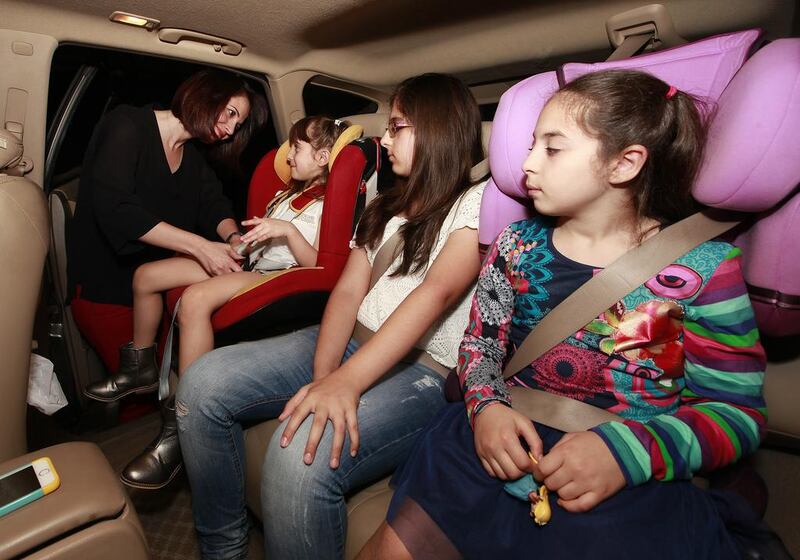ABU DHABI // Almost half of Emirati parents do not have car safety or booster seats for their children, a survey suggests.
Reasons from the 47 per cent who say they do not need to buy car restraints include that they are too expensive, their children do not like being buckled up, or that holding a child is safer.
Others say they do not strap in their children for religious or cultural reasons.
But Thomas Edelmann, founder of RoadSafetyUAE, said the need to keep children safe transcended all excuses.
“The main message is a very simple one – if you love your kids, buckle them up on all trips,” Mr Edelmann said.
Overall, the YouGov survey of more than 1,000 parents found that 34 per cent see no need to buy child car seats.
Almost a third of those who do not provide car safety seats say they are too expensive, despite the fact that they can be bought for as little as Dh200.
Another 28 per cent say their children do not like to be strap-ped in, a quarter say they do not know which child seat to buy, and 15 per cent believe passengers holding children is as safe as restraints.
Fifteen per cent say they are safe drivers and not likely to be in an accident, 7 per cent gave religious reasons, and 5 per cent say it is not part of their culture.
“These reasons reflect a lack of education and understanding of the importance of child car seats,” said Dr Reem Al Ameria, a child safety campaigner from Jordan.
“Car seats come in several types, brands and prices, and I can understand that it can become a major expense for those with more than one child.
“People used to think that if it was important, there would be a law. Now there is one.”
Last month, police announced laws, to come into effect on July 1, that require all passengers regardless of age to be buckled up at all times.
The driver is responsible to ensure that and faces a Dh400 fine and four black points on their licence if they fail to do so.
“Many parents would say that it is not part of their culture, that ‘we didn’t grow up knowing or using a car seat and if we survived that, then so will our kids’,” said Dr Al Ameria, a mother of three.
“We need to make child safety a part of this culture and hopefully do not need police to tell parents they need to buckle up and use car seats.
“All parents love their children and will do better if they know better. Our job is to make them know better.”
Correct use of car seats can reduce the likelihood of an infant dying in a car crash by 70 per cent, the World Health Organisation says.
Of the 66 per cent of parents who own child car seats, 70 per cent always made their children buckle up, the survey shows.
But only 51 per cent of all Emirati parents and 42 per cent of parents between the ages of 18 and 24 use car seats to protect their children.
“To change this mindset, we need to put so much effort in the coming months on educating the public on the importance of child car seats and how to choose the proper one for their child,” Dr Al Ameria said.
It would appear, however, that her work and that of others pushing for child restraint awareness has paid some dividends over the past decade.
A UAE University study from 2008 showed that only 2 per cent of the population were buckling their children into car seats or strapping them in with a safety belt.
The study found that almost a quarter of children were riding in the front seat of a car, which even then was illegal.
Findings from a survey last month found that half of Emirati drivers and more than a third of young motorists still did not wear seat belts when behind the wheel.
The survey was commissioned by RoadSafetyUAE and QIC Insured.
rruiz@thenational.ae






